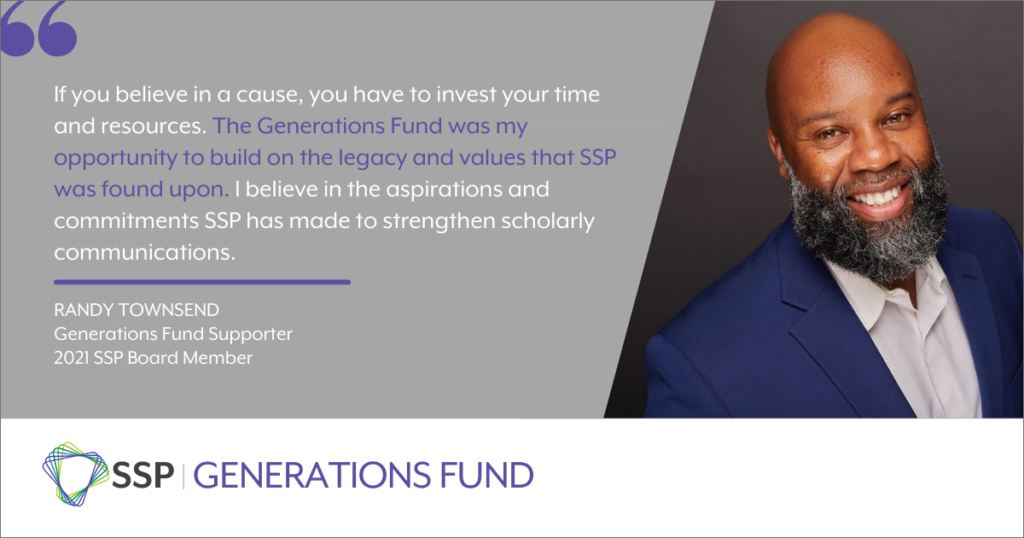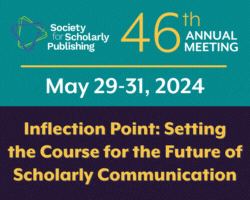Randy Townsend has been in scholarly communications for 15 years, and a member of SSP since 2010. He was elected to the SSP Board of Directors in 2021 and is serving on the 2022 Annual Meeting Program Committee. In the past, he has co-chaired the SSP Diversity, Equity, and Inclusion Committee, as well as served as a Mentor. Randy was one of the first SSP members to support the Generations Fund when it launched in 2020. We sat down to speak with him about why it was important for him to be involved with SSP and the Generations Fund.

How did you first become involved in scholarly communications?
I stumbled into this world through dumb luck. I went to a temp agency, and they referred me to this place I had never heard of before – the American Geophysical Union (AGU). I initially temped as a production coordinator and remember being trained to edit XML, which was the first time I had ever seen markup language. My mind was just so blown, and I began thinking about all the things I didn’t know existed and I was hungry to explore more about what AGU was doing in scholarly communications.
Thank goodness, AGU liked me as a temp and hired me full-time! While working at AGU I came across the George Washington University (GW) Masters in Publishing program in a newspaper advertisement. I enrolled and, eventually, completed my master’s studies. This whole process, of finding AGU and then the GW program, it felt like finding my professional home. And I have come full circle because I am now the inaugural editor in GW’s Journal of Ethics in Publishing and a professor in the same program I earned my master’s in.
Tell us what excites you about your work in scholarly communications?
One of the elements of my GW program focused on publishing ethics. I found this so interesting, that during a luncheon at AGU I shared with my colleagues the nuggets of information that I had gleaned during my coursework. The next day, an AGU Vice President came walking down my line of cubicles – pulling closer and closer to my humble nook at the end of the line. Turns out, AGU was launching the first ethics policy review in more than a decade and wanted me to be the staff liaison for the committee.
Years later, in 2016, another publishing society experienced an issue related to sexual harassment in their membership. The society was not prepared for this kind of scenario. At AGU we realized we had not asked ourselves critical questions and defined our role or responsibilities should we be faced with similar situations.
AGU convened another task force and conducted a series of meetings with other societies, and we discussed what our members expected of us, and what we could legally accomplish. We were the first organization to formally include harassment, discrimination, and bullying as official forms of scientific misconduct. Previous ethic rules protected the integrity of the research. We were taking the extra step to protect the researcher. If someone is marginalized, excluded, or victimized then they are not going to feel comfortable fully engaging or contributing. We are losing valuable science from potential geniuses because they feel unsafe. We made it clear we will not tolerate bad actors. We developed – and continue to develop – programs focused on expanding participation, diversifying Earth and space science, and making our activities at all levels more equitable and inclusive.
How did you get involved with SSP?
AGU and SSP have a longstanding relationship with each other. When I originally joined AGU, Fred Spilhaus was Executive Director and Judy Holoviak was the Director of Publications. Fred and Judy were founding board members of SSP. As I started to take on more responsibilities at AGU, I was encouraged to attend SSP meetings. The more SSP events I attended, the more I wanted to get involved. I was like a sponge and couldn’t get enough. I had exposure to individuals like Barbara Meyers Ford and Adrian Stanley, who became mentors to me. Attending opportunities morphed into presenting and authoring opportunities.
Eventually, I participated in the DEI Task Force, which established itself as the DEI Committee and I was invited to serve as co-chair. And now I am joining the board for the first time! I just find every time I attend an SSP event, it’s the folks having inspiring conversations that energize me.
Why did you choose to be one of the first supporters of the Generations Fund?
One of the last times I was with Barbara Meyers Ford, she was telling me how SSP formed. The group of individuals who became the founding members, agreed to start this organization during conversations around a table. And they asked themselves how do we formalize this organization? So, everyone pulled out whatever cash they on them and put it down on the table to form the first “budget” of the organization. And that story resonated with me. That was such a pivotal moment for scholarly publishing.
When I read the email announcing the Generations Fund launch, I saw that as my opportunity to build on Barbara’s and the others founders’ legacy. It was my turn to offer what support I could to launch something new and lasting.
I really do believe in what SSP aspires to be and achieve. I sincerely believe SSP always wants to evolve and is thoughtful in its approach to advancing the future of scholarly communications for the better. I am not a thousands of dollars donor, but I want to do my part so we can collectively reach our goal!
Join Randy with your gift today to the Generations Fund!


